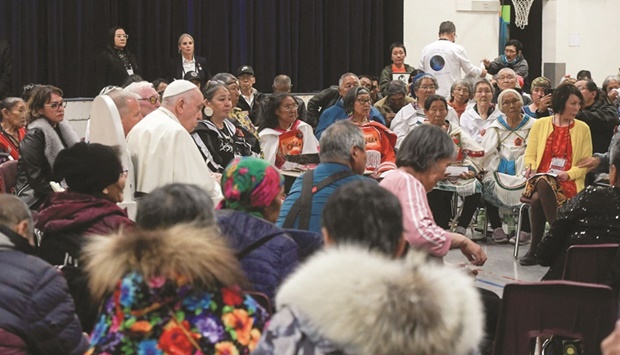Pope Francis said yesterday the decades-long abuse of Indigenous schoolchildren across Canada amounted to “genocide” as he returned from a six-day trip with an acknowledgement that he needed to slow down his pace of travel — or could even resign.
During his “penitential pilgrimage” across Canada this week, the 85-year-old Pope offered a historic apology to the First Nations, Metis and Inuit people for what he called the “evil” committed at Catholic-run residential schools.
Speaking to reporters on his return home, the head of the world’s 1.3bn Catholics used the word “genocide” to describe the treatment of children wrenched from their families and cultures to attend the state schools.
While he told reporters the word “didn’t come to my mind” while in Canada, “I did describe the genocide. And I asked for forgiveness for this process which was genocide”.
“Taking away children, changing the culture, changing the mentality, changing the traditions, changing a race, let’s put it that way, a whole culture,” he said.
Although Francis’s unprecedented apology was mostly welcomed across Canada, from western Alberta to Quebec and the far north, many survivors said much more needed to be done for reconciliation.
Canada was the Pope’s 37th international trip since he was elected in 2013, but he admitted he would have to slow down his pace due to knee problems that saw him spent much of the visit in a wheelchair.
“I think that at my age and with this limitation, I have to save myself a little bit to be able to serve the Church. Or, alternatively, to think about the possibility of stepping aside,” the Pope said.
It was not the first time Francis has said that, if required, he could follow his predecessor Benedict XVI, who made history in 2013 by resigning due to his own declining health.
“The door is open, it’s one of the normal options, but up until now I haven’t knocked on this door,” he said yesterday.
“But that doesn’t mean the day after tomorrow I don’t start thinking, right? But right now I honestly don’t.”
Ruling out surgery due to the risks of anaesthesia at his age, the Pope — who underwent colon surgery last year — said he still planned to travel to Kazakhstan in September, and still had hopes of a trip one day to war-torn Ukraine.
He had wrapped up his Canadian journey Friday in the capital of the vast northern territory of Nunavut, Iqaluit, again asking forgiveness for abuse committed at the 139 residential schools run by the Catholic Church.
About 150,000 Indigenous children were sent there from the late 1800s to the 1990s.
“I want to tell you how very sorry I am and to ask for forgiveness for the evil perpetrated by not a few Catholics who contributed to the policies of cultural assimilation,” he said.
Many children were physically and sexually abused at the schools, and thousands are believed to have died of disease, malnutrition or neglect, in what a truth and reconciliation commission later called a “cultural genocide”.
Residents in Iqaluit, a community of just over 7,000 people and where small houses line the rocky ocean shore, have listened closely to the Pope’s words throughout his trip.
“He did apologise, and a lot of people don’t seem to be happy with it, but he took that step to come to Nunavut... and I think that’s big,” lifelong Iqaluit resident Evie Kunuk, 47, told AFP.

Pope Francis attends a meeting with former students of residential schools at the Nakasuk Elementary School in Iqaluit, Canada. (Reuters)
